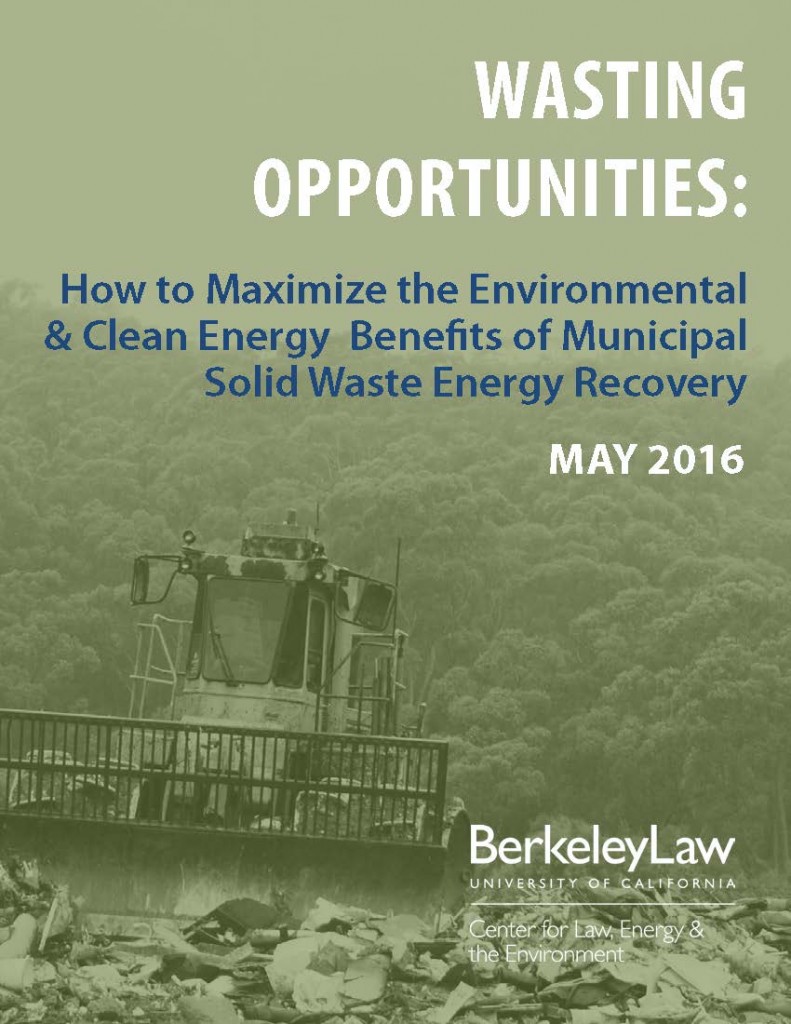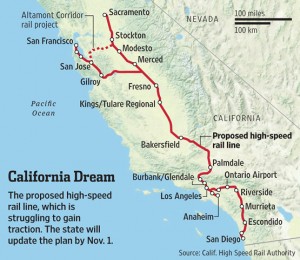Los Angeles mayor Eric Garcetti made headlines recently by unveiling the city’s version of a “Green New Deal,” complete with ambitious goals to create a zero-emission transportation network, a zero-carbon electricity grid, and a Los Angeles that “won’t send a single piece of trash” to the landfill by 2050.
The goals in the new sustainability plan [PDF] are necessary to meet our environmental and sustainability needs, but how can the city make them feasible to achieve?

I discussed the zero-waste goal in particular on KPCC radio’s AirTalk program, along with my UCLA Law colleague Cara Horowitz. My comments were drawn largely from the 2016 CLEE report “Wasting Opportunities” on boosting energy recovery from municipal solid waste to meet climate goals.
The bottom line? Achieving zero waste will require significant reduction of materials in use, increases in recycling and composting, and — yes — some type of energy recovery from whatever is left over. You can listen to the broadcast here.
High speed rail has been in the news lately for all the wrong reasons, with a scathing state audit indicating that hundreds of millions of dollars — if not billions — may ultimately be wasted by starting construction too early to meet political deadlines, as well as other mismanagement.
I debated the future of the system last week on KPCC radio in Los Angeles, on the program Airtalk with Larry Mantle. Sparring with me was James Moore, civil engineering professor at the University of Southern California (and longtime anti-rail academic).
You can listen to the first part of the show on the Airtalk website, but the full audio (including my last rebuttal to Prof. Moore) is available here.
The short story? Some of the mismanagement is due to the complicated politics of building such a controversial system through the heart of Tea Party California opposition, while the system in general will still be needed to serve a growing population and connect the Central Valley cities to the prosperous coastal economies.
 Los Angeles residents have been debating a recent proposal to implement congestion pricing around the region’s most congested area, as London, Stockholm and other cities have successfully implemented.
Los Angeles residents have been debating a recent proposal to implement congestion pricing around the region’s most congested area, as London, Stockholm and other cities have successfully implemented.
The idea is straightforward: charge drivers to enter the congested area during peak commute times. The tolls will discourage extraneous trips and encourage people to drive during off-peak times when they can. Traffic then falls within the tolled area. Meanwhile, the money raised can support transit investments there.
Larry Mantle’s AirTalk program on KPCC recently explored the proposal in a segment with UCLA professor Mike Manville and journalist Felix Salmon. Manville has conducted important research demonstrating that congestion pricing doesn’t necessarily hurt poor people disproportionately, as critics of the policy often allege.
Manville made a strong case for congestion pricing, but he got tripped up by a caller and Mantle when he argued that right now drivers use the roads for free. They pointed out that gas taxes and other fees help pay for roads, so they’re already paying for them. Manville instead argued that nobody pays for using the space on the road, which is a nuanced point.
The problem, politically speaking, is that people are going to recoil being charged for using something that 1) they previously used for free and 2) they feel they already pay for through other fees and taxes. The policy proposal will be vulnerable as a result, unless backers can describe how the additional fee or toll will give them a specific benefit. In this case, the benefit is reduced congestion.
Perhaps a better framing question would be: how much would you pay per car trip to avoid being stuck in traffic?
With the Gold Line opening in Los Angeles over the weekend, and the Expo Line to Santa Monica not far behind, Larry Mantle on KPCC radio’s AirTalk covered yesterday what these new lines will mean for mobility in the region.
I participated in the discussion along with Meghan McCarty, KPCC’s commuting and mobility reporter. You can listen here.
To my mind, the opening of these rail projects currently under construction will mean that we’ll finally have a functional rail network in Los Angeles. But that will still take years. The Purple Line subway, Crenshaw line, and regional connector are all a ways away from opening.
In the meantime, while I’m a wet blanket on the Gold Line extension to Azusa, the opening of Expo in a few months will mark a major milestone for rail in the region.
I’ll be joining LA’s KPCC Radio (89.3 FM) “AirTalk” program with Larry Mantle today at noon to discuss the SB 743 reforms to the California Environmental Quality Act (CEQA). The show comes on the heels of the recent LA Times editorial applauding the reforms, which help infill development by eliminating traffic delay in the immediate project area as an area of study under CEQA. The Times, however, calls for local governments to maintain some level of transportation analysis for projects within one-half mile of transit, given that some bad projects (like big parking lots) could sneak through under this reform.
UPDATE: Audio is now available via this link, along with listener comments on the topic.
Today at noon in the LA area I’ll be on Larry Mantle’s AirTalk program, 89.3 FM (KPCC public radio). Joining me for the hour-long segment will be Art Leahy, CEO of LA Metro, and we’ll be discussing the past, present and future of LA Metro Rail. I imagine I’ll be speaking mostly about what I’ve learned in researching and writing my book Railtown, so it should be fun to have Mr. Leahy there to respond. Join if you can, and I’ll post the link after it airs.
UPDATE: The link to the audio, along with a page for commenting, can be found here.



